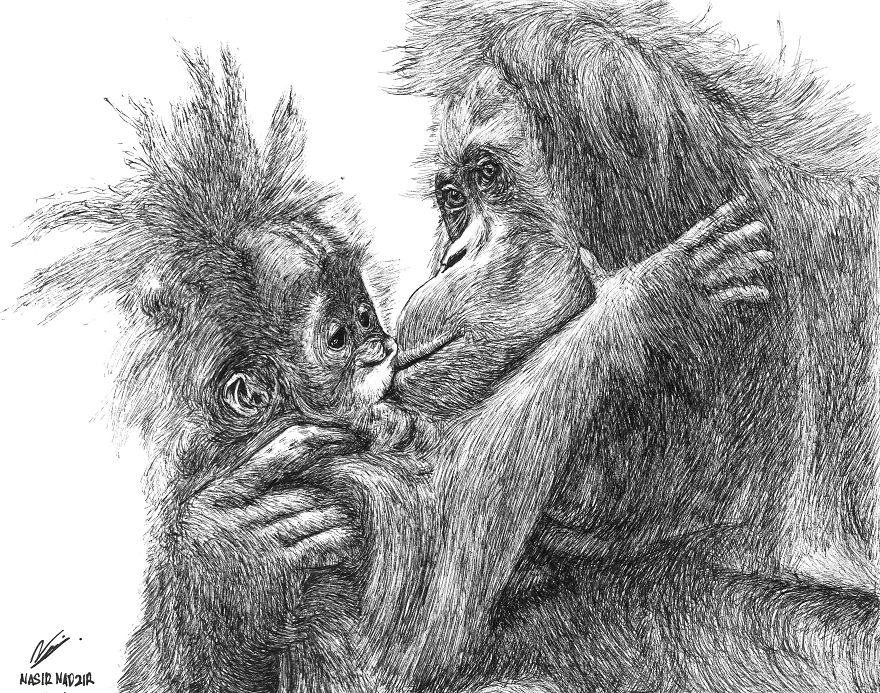Orangutan
The name “orangutan” (also written orang-utan, orang utan, orangutang, and ourang-outang) is derived from the Malay and Indonesian words orang meaning “person” and hutan meaning “forest”, thus “person of the forest”. Orang Hutan was originally not used to refer to apes, but to forest-dwelling humans. The Malay words used to refer specifically to the ape are maias and mawas, but it is unclear if those words refer to just orangutans, or to all apes in general. The first attestation of the word to name the Asian ape is in Dutch physician Jacobus Bontius’ 1631 Historiae naturalis et medicae Indiae orientalis – he reported that Malays had informed him the ape was able to talk, but preferred not to “lest he be compelled to labour”.
Orangutans are among the most intelligent primates. Experiments suggest they can figure out some invisible displacement problems with a representational strategy.In addition, Zoo Atlanta has a touch-screen computer where their two Sumatran orangutans play games. Scientists hope the data they collect will help researchers learn about socialising patterns, such as whether the apes learn behaviours through trial and error or by mimicry, and point to new conservation strategies. A 2008 study of two orangutans at the Leipzig Zoo showed orangutans can use “calculated reciprocity”, which involves weighing the costs and benefits of gift exchanges and keeping track of these over time. Orangutans are the first nonhuman species documented to do so. Orangutans are very technically adept nest builders, making a new nest each evening in only in 5 to 6 minutes and choosing branches which they know can support their body weight.
During the early 2000s, orangutan habitat has decreased rapidly due to logging and forest fires, as well as fragmentation by roads. A major factor in that period of time has been the conversion of vast areas of tropical forest to palm oil plantations in response to international demand. Palm oil is used for cooking, cosmetics, mechanics, and biodiesel. Hunting is also a major problem as is the illegal pet trade. Orangutans may be killed for the bushmeat trade, crop protection, or for use for traditional medicine. Orangutan bones are secretly traded in souvenir shops in several cities in Kalimantan, Indonesia.
Mother orangutans are killed so their infants can be sold as pets, and many of these infants die without the help of their mother.
Size: A3
Technical Pen (Faber Castell)
The name “orangutan” (also written orang-utan, orang utan, orangutang, and ourang-outang) is derived from the Malay and Indonesian words orang meaning “person” and hutan meaning “forest”, thus “person of the forest”. Orang Hutan was originally not used to refer to apes, but to forest-dwelling humans. The Malay words used to refer specifically to the ape are maias and mawas, but it is unclear if those words refer to just orangutans, or to all apes in general. The first attestation of the word to name the Asian ape is in Dutch physician Jacobus Bontius’ 1631 Historiae naturalis et medicae Indiae orientalis – he reported that Malays had informed him the ape was able to talk, but preferred not to “lest he be compelled to labour”.
Orangutans are among the most intelligent primates. Experiments suggest they can figure out some invisible displacement problems with a representational strategy.In addition, Zoo Atlanta has a touch-screen computer where their two Sumatran orangutans play games. Scientists hope the data they collect will help researchers learn about socialising patterns, such as whether the apes learn behaviours through trial and error or by mimicry, and point to new conservation strategies. A 2008 study of two orangutans at the Leipzig Zoo showed orangutans can use “calculated reciprocity”, which involves weighing the costs and benefits of gift exchanges and keeping track of these over time. Orangutans are the first nonhuman species documented to do so. Orangutans are very technically adept nest builders, making a new nest each evening in only in 5 to 6 minutes and choosing branches which they know can support their body weight.
During the early 2000s, orangutan habitat has decreased rapidly due to logging and forest fires, as well as fragmentation by roads. A major factor in that period of time has been the conversion of vast areas of tropical forest to palm oil plantations in response to international demand. Palm oil is used for cooking, cosmetics, mechanics, and biodiesel. Hunting is also a major problem as is the illegal pet trade. Orangutans may be killed for the bushmeat trade, crop protection, or for use for traditional medicine. Orangutan bones are secretly traded in souvenir shops in several cities in Kalimantan, Indonesia.
Mother orangutans are killed so their infants can be sold as pets, and many of these infants die without the help of their mother.
Size: A3
Technical Pen (Faber Castell)




2
0